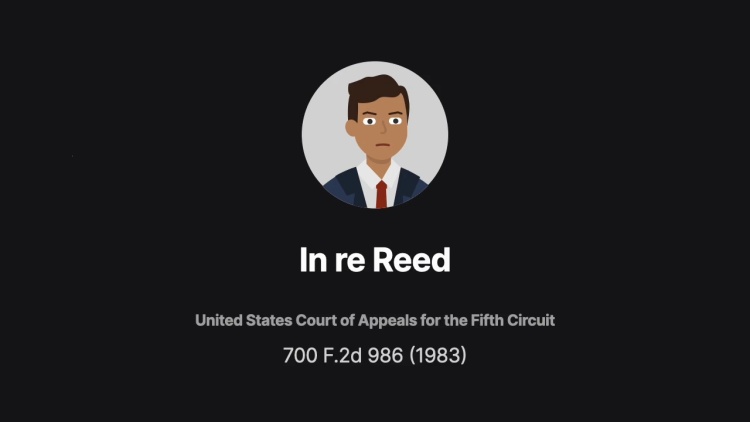In re Reed
United States Court of Appeals for the Fifth Circuit
700 F.2d 986 (1983)
- Written by Ryan Hill, JD
Facts
Hugh Reed (defendant) opened a retail store called Reed’s Men’s Wear (RMW) in Texas. The Small Business Administration guaranteed a $150,000 loan plus a $50,000 line of credit from Texas Bank & Trust Company (Texas Bank) (plaintiff). After a year, the store began to lose money. Reed knew the business was failing and insolvent. Reed convinced his trade creditors to temporarily postpone collection. The business ultimately failed, and Reed surrendered the store to foreclosure with Texas Bank. Reed filed voluntary petitions for bankruptcy six days later. In the four months prior to filing for bankruptcy, Reed engaged in prebankruptcy planning. Reed bought and sold valuable guns, antiques, and stocks. Reed caused Reyata, a corporation he owned, to borrow $11,000, which Reed used to purchase antiques. Reed also opened a hidden bank account. Reed deposited the receipts from RMW in this account, unbeknownst to his creditors, and repaid Reyata for the $11,000 loan from this hidden account. Days before filing for bankruptcy, Reed sold the guns, antiques, and stocks at a steep discount and applied the proceeds to his mortgage. Additionally, Reed claimed to be unable to explain almost $20,000 in missing cash. The bankruptcy judge found that Reed did not qualify for discharge due to converting nonexempt property to exempt property with intent to defraud, hinder, or delay, and separately due to the missing $20,000. The district court affirmed the bankruptcy court’s opinion.
Rule of Law
Issue
Holding and Reasoning (Rubin, J.)
What to do next…
Here's why 907,000 law students have relied on our case briefs:
- Written by law professors and practitioners, not other law students. 47,100 briefs, keyed to 996 casebooks. Top-notch customer support.
- The right amount of information, includes the facts, issues, rule of law, holding and reasoning, and any concurrences and dissents.
- Access in your classes, works on your mobile and tablet. Massive library of related video lessons and high quality multiple-choice questions.
- Easy to use, uniform format for every case brief. Written in plain English, not in legalese. Our briefs summarize and simplify; they don’t just repeat the court’s language.





